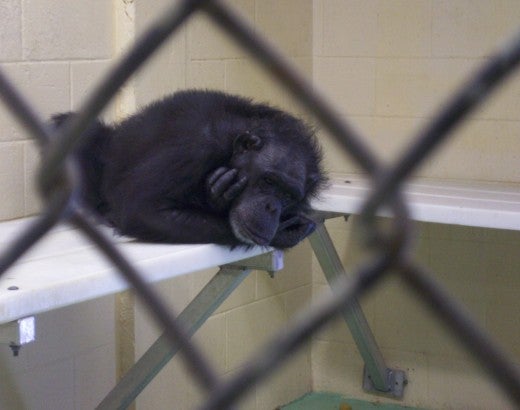We have been advocating on behalf of chimps used in biomedical research for decades. In 2000, we helped to secure passage of the Chimpanzee Health Improvement, Maintenance and Protection Act (CHIMP) Act, a law that created a federal sanctuary for government chimpanzees previously used in research. And, in 2015, in response to a legal petition we filed, invasive research on chimpanzees came to an end in the United States. Shortly afterwards, NIH announced it would transfer all federal chimpanzees to Chimp Haven, which has been designated as the federal sanctuary.
Then, in 2019, NIH made the shocking announcement that it would not be moving the remaining chimps living at Alamogordo to Chimp Haven as promised. At the time of this incredibly cruel decision, there were 44 chimps at the laboratory, all of whom had been living there since at least 2001. NIH claimed that these chimps were too frail to be moved due to health concerns, even though sick and elderly chimpanzees are frequently relocated to sanctuaries without incident.
We were outraged by this decision, and so were more than 150,000 of you who stood alongside us in demanding that the agency send the Alamogordo chimps to sanctuary. In 2021, when NIH still refused to take positive action, we sued, arguing NIH’s refusal to move the chimps to Chimp Haven violated the CHIMP Act. In December 2022, a federal judge agreed, finding that NIH’s decision to deny sanctuary retirement to dozens of chimpanzees because of their chronic health conditions was illegal.
After this victory, we were hopeful that the agency would finally do the right thing. Yet despite the judge’s ruling, NIH made statements to the media last spring indicating it still didn’t plan to move the chimps. In light of NIH’s continued refusal to act, we appealed to our supporters and again more than 135,000 of you contacted NIH, demanding that the agency move the chimpanzees to Chimp Haven as required by law. Last month, we launched an advertising campaign focused on the chimps that targeted the area in Bethesda, Maryland, where the NIH campus is located.
After years of advocating on behalf of the Alamogordo chimps, we were elated when we learned that NIH had changed its mind again—this time thankfully to the benefit of the chimps and in line with the CHIMP Act, which applies to all federal chimpanzees still in laboratories. There are still an additional 48 government owned and supported chimps at two laboratories in Texas. We are determined to see that every chimp owned and supported by the government gets the sanctuary retirement they deserve.
Our celebration is only undercut by the knowledge that today’s announcement comes too late for 21 chimpanzees who passed away during the five years since NIH reversed its initial decision. The agency’s foot-dragging condemned these incredible animals—who had endured a lifetime of suffering—to spend their final years and days in a sterile laboratory with barren outdoor enclosures—the very same facility in which they were subjected to harmful experiments.
Although we are heartbroken that those 21 chimpanzees were never able to experience the freedom of sanctuary life at Chimp Haven, we are overjoyed that the 23 remaining at the laboratory will soon have that chance.
Sara Amundson is president of the Humane Society Legislative Fund.




